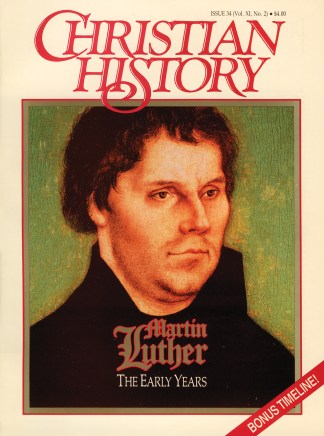I was seized with the conviction that I must understand [Paul’s] letter to the Romans … but to that moment one phrase in chapter 1 stood in my way. I hated the idea, “in it the righteousness of God is revealed.” … I hated the righteous God who punishes sinners …
At last, meditating day and night and by the mercy of God, I … began to understand that the righteousness of God is that through which the righteous live by a gift of God, namely by faith. … Here I felt as if I were entirely born again and had entered paradise itself through gates that had been flung open. —Martin Luther
Martin Luther turned the preface to his collected Latin works, written the year before he died, into an extended autobiographical comment. Almost in passing he included a now-famous remark: “I felt as if I were entirely born again and had entered paradise itself through gates that had been flung open.”
Historians have come to call this event “the tower experience” or the “evangelical breakthrough,” and they have tried to date it and identify where it occurred.
When: Early or Late?
Luther’s preface also reports that “Meanwhile, already during that year, l had returned to interpret the Psalter anew.” Luther then adds that he was forced to break off these lectures when Charles V called the Diet of Worms. Consequently, Luther could be referring only to his second lectures on the Psalms (held from late 1518 to the Diet of Worms in 1521) rather than those of 1513–1515.
Moreover, the most cursory reading of his earlier lectures on the Psalms, and those on Romans (1515–1516), Galatians (1516–1517), and Hebrews (1517–1518) clearly reveals that his mind was in motion almost from the moment he first entered his lecture hall. Thus, all the evidence supports dating Luther’s breakthrough between 1518 and 1521, as he was preparing his normal university lectures.
Where: Bathroom or Study?
Luther writes elsewhere that the breakthrough occurred when he was In cloaca, which literally means “in the toilet.” Some writers have thus suggested that Luther was sitting on the toilet at that moment; the revelation was a release from parentally induced anal retentiveness.
Dispensing with the toilet theory is easy. “in cloaca” was a bit of monastic slang better rendered as “in the dumps” or “in the pits.” Luther meant that the realization occurred when he was despondent or depressed. He wrote that the event transpired “at last (after) meditating day and night and by the mercy of God. …” Hence, he was likely in his study, which was located not in the tower but in the arch over the main gate into the monastery.
How: Suddenly or over Time?
The crucial question concerns the nature of the event: Was it something that happened suddenly, a conversion in the twinkling of an eye?
Such a conclusion is most unlikely. The evidence of Luther’s early lectures shows that, like most thinkers who are extraordinarily blessed, he had come to this understanding far earlier than he realized it. In his preface, Luther was referring to that moment when he said to himself, “Aha! Now I know!” when in fact, he had known (or been knowing) it for some time. As he explained, it happened “at last” and “I did not learn my theology all at once.”
Ultimately, what matters most about Luther’s breakthrough is not the precise date or location, but the fact that it happened.
Dr. James M. Kittelson is professor of history at The Ohio State University, Columbus, Ohio, and author of Luther the Reformer (Augsburg, 1986).
Copyright © 1992 by the author or Christianity Today/Christian History magazine.Click here for reprint information on Christian History.









